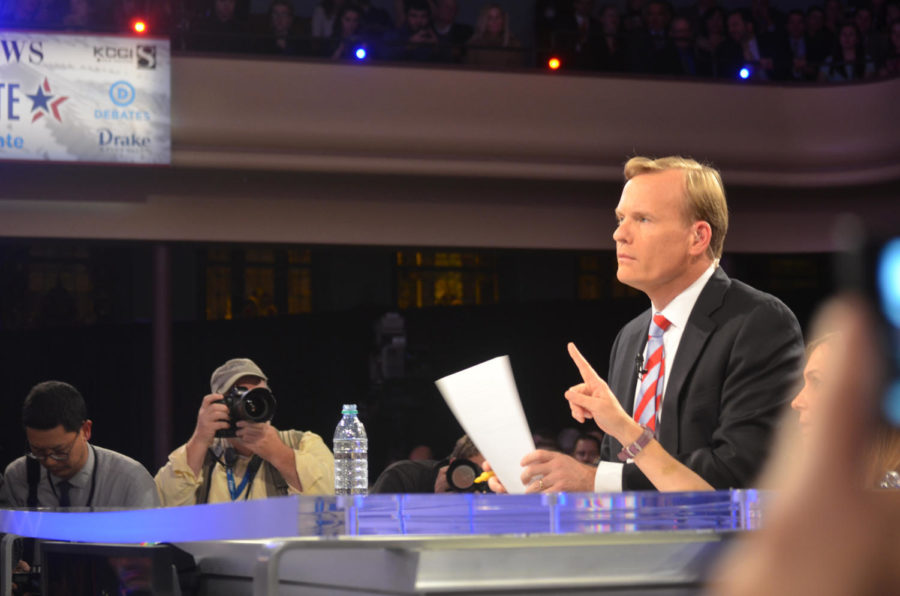- App Content
- App Content / News
- News
- News / Politics And Administration
- News / Politics And Administration / State
Democrats battle through second debate
November 14, 2015
DES MOINES, Iowa — Democratic candidates for president came out swinging Saturday night, with Sen. Bernie Sanders and Gov. Martin O’Malley launching attacks on front-runner Hillary Clinton’s ties to Wall Street and foreign policy against international terrorism.
The second Democratic debate took place on the campus of Drake University, with CBS News’ “Face The Nation” anchor John Dickerson moderating. CBS News reporter Nancy Cordes, KCCI-TV anchor Kevin Cooney and Des Moines Register political columnist Kathie Obradovich also questioned the candidates on a wide range of issues.
The debate stage was smaller this time around, with Jim Webb and Lincoln Chafee missing after dropping out from the race. Clinton was center stage, with Sanders and O’Malley on each side.
Foreign policy opened the debate in light of the terrorist attacks in Paris that killed more than 120 and injured hundreds just 24 hours before the debate.
Clinton opened the discussion on ISIS, saying the United States does not need to undertake the bulk of effort against the terrorist group. Instead, she said the United States should arm and train its allies, particularly in the Middle East, where the group is most prominent.
This is not an American fight, she said, but American leadership is essential.
“That is why we have troops in Iraq that are helping to train and build back up the Iraqi military, why we have special operators in Syria working with the Kurds and Arabs, so that we can be supportive,” Clinton said.
Sanders and O’Malley both disagreed with Clinton’s stance on taking on international terrorism.
O’Malley said this issue is America’s fight, but, “it cannot solely be America’s fight.”
O’Malley’s solution was not only collaborating with allies but also an improvement in human intelligence on the ground. O’Malley said it was not an issue of toppling dictatorships or regimes, but the arc of instability that follows these events.
“We are not so very good at anticipating threats and appreciating just how difficult it is to build up stable democracies, to make the investments and sustainable development that we must as a nation if we are to attack the root causes of these sorts of instability,” O’Malley said.
Moderators asked Sanders if he stands by his past statements that climate change is the biggest issue facing the United States. He said that he “absolutely” stands by it, and that it is directly related to the growth of terrorism.
“And if we do not get our act together and listen to what the scientists say, you’re going to see countries all over the world — this is what the CIA says — they’re going to be struggling over limited amounts of water, limited amounts of land to grow their crops and you’re going to see all kinds of international conflict,” Sanders said.
Sanders and O’Malley also went after Clinton for her role in the invasion of Iraq, a measure she voted in favor for in 2002 while the senator for New York.
When questioned about financial issues and Wall Street, Sanders and O’Malley said Clinton is the candidate most beholden to interests on Wall Street.
“Why over her political career has Wall Street been a major campaign contributor to Hillary Clinton?” Sanders asked. “I mean, maybe they’re dumb, and they don’t know what they’re going to get, but why do they make millions of dollars of campaign contributions? They expect to get something.”
Sanders said he supports reinstating a modern-day form of Glass-Steagall, which were financial regulations passed by Congress in the 1930s but later repealed in the late 1990s, and would “break up” big banks if elected.
Clinton came back with a fiery response, saying Sanders “impugned” her integrity, and said her plan on Wall Street is “tougher” and would go after all sectors, not just big banks.
O’Malley interjected throughout their discussion, but Clinton and Sanders continued to battle back and forth. O’Malley said he would not answer to Wall Street if president.
There were also smaller disagreements on other issues, including education. Clinton said she disagreed with Sanders’ idea of free college tuition for all.
“I disagree with free college for everybody,” Clinton said. “I don’t think taxpayers should be paying to send Donald Trump’s kids to college.”
On immigration, O’Malley called Republican front-runner Donald Trump an “immigrant-bashing carnival barker” after being asked if he would compromise on border security before other reforms were made to the immigration system.
“We’ve been focusing on border security to the exclusion of talking about comprehensive immigration reform,” O’Malley said. “Our symbol is the Statue of Liberty, it is not a barbed wire fence.”
Sanders and O’Malley also agreed on raising the minimum wage, saying it should be raised at the federal level to $15 per hour. Clinton backs raising the wage to $12 per hour, adding she takes into account economists who have said doubling the floor wage businesses can pay could result in job losses.
Sanders stuck out in the first debate for saying he and the American people were “sick and tired” of hearing about Clinton’s “damn emails,” a reference to ongoing scrutiny over her use of a private email server. Sanders stood firm Saturday night, saying he is, indeed, “still sick and tired,” and wanted to talk about the real issues.
Saturday’s debate was put on by CBS in conjunction with Twitter, KCCI-TV and The Des Moines Register.
All three candidates remain in the state Sunday, with Clinton and O’Malley attending a barbeque event at 12:30 p.m. in Ames.
















